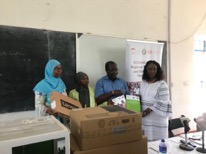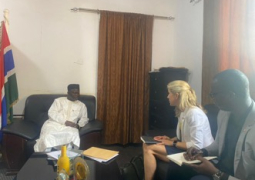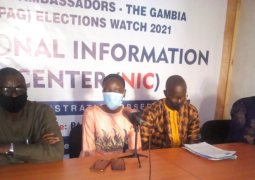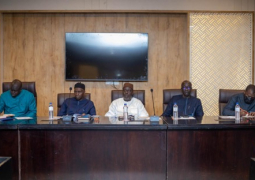
The handing over of the materials to the school yesterday in Banjul was done by GIZ ECOWAS FRSD in their quest to support young people, especially migrant returnees.
The equipment included a laptop, two projectors, one printer, one desktop computer and 15 sets of cartridges. They also developed a training manual for levels one and two and are sponsoring 20 students to attend the programme.
Mariama Ashcroft, acting team head of GIZ ECOWAS FRSD, emphasised that the total cost of the support they provided was more than €30,000, clarifying that the amount included the cost of hiring the consultant, reviewing and processing the manual, graphics design, and training of trainers.
She said the project was funded by the government of Germany in collaboration with the ECOWAS Commission, reiterating that their support to the school of nursing is very important and is one of their milestone initiatives.
“Mental Health and Psychosocial Support (MHPS) has been the most self-awareness and mind-shaping initiative for young people to live holistically in our community,” she said. “Globally, mental health and psychosocial support remain to be a challenge in different areas ranging from human resources, to structures, government and management. In our communities, homes, hospitals and schools, we continue to live with people in need of mental health and psychosocial support.”
She stated that GIZ ECOWAS has a strong programmatic indicator which focuses on addressing underlined root causes and impact of irregular migration. She added that in designing a more holistic programme which would support migrant returnees and young people in and out of school, and women in the productive sectors of the economy, they had designed programmes providing services in capacity building, coaching and mentorship skills in poultry, horticulture and fisheries value chain.
“MHPS remains a challenge to most returnees and they are mostly exposed to a series of human rights violations under very dehumanising conditions which include different forms of torture, physical abuse, emotional torture and violence,” she pointed out, saying: “It is very critical to help in supporting their mental and emotional well-being upon their return, which has different layers from individuals, families, and communities. To address such a challenge, there is a need to strengthen capacity in psychosocial support services.”
Fatoumatta Bah, Head of the School of Nursing and Midwifery, explained that the course came per the urgent call and need for the services the programme has to offer to the people in need. She said they knew that recently, the world witnessed illegal migration and with globalisation, a lot of people are living with some mental health and psychosocial issues.
“We thought it wise to develop a programme that would answer and cater for the need of our population,” she said. “Along the journey, we feel for collaboration and assistance and the first person that answered our call is GIZ ECOWAS.”
Aboubacar Jallow, Principal of the Gambia College, expressed delight, assuring that the materials would be put to best use. As a college, he added, they have taken mental health “very seriously”.





